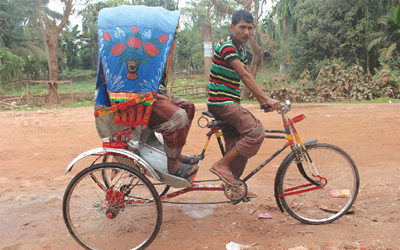Rickshaws play a vital role in providing affordable transportation in cities and towns. For the poor and underprivileged individuals who may not have access to formal employment or steady income, a rickshaw serves as a valuable asset. Through our Livelihood Support Program, we distribute rickshaws to empower individuals by offering a sustainable means of earning. Rickshaw pullers can earn a daily income by providing transportation services to commuters, helping them meet their basic needs while gaining a sense of financial independence. This initiative not only promotes self-employment but also contributes to the overall economy of the community by enhancing mobility and access to essential services.

Van Distribution to Poor People:
Vans are crucial for individuals involved in small-scale delivery businesses. Many poor families have the skills and knowledge to run businesses, but they often lack the means of transporting goods. By providing vans, we enable recipients to become entrepreneurs who can carry goods for businesses, farms, or individuals in need of delivery services. This opens up opportunities for work in the transport sector and helps small businesses grow by improving their access to markets and customers. With a van, individuals can support their families and contribute to the local economy by facilitating the movement of goods and services, thus breaking free from the limitations of poverty.
Fishing Boat Distribution to Poor People:
For families living in coastal and riverine areas, fishing is often the primary means of livelihood. However, many of these families struggle due to a lack of proper equipment, which limits their ability to fish and provide for their households. By providing fishing boats through our Livelihood Support Program, we enable families to access fishing resources more effectively, allowing them to catch fish in sufficient quantities for sustenance and income generation. This initiative empowers families to gain economic independence, improve their quality of life, and contribute to their community’s food supply and local economy. For these families, the fishing boat is not just a tool—it’s a lifeline to breaking the cycle of poverty and ensuring a more stable, prosperous future.
